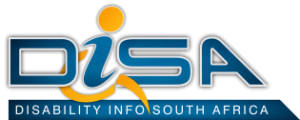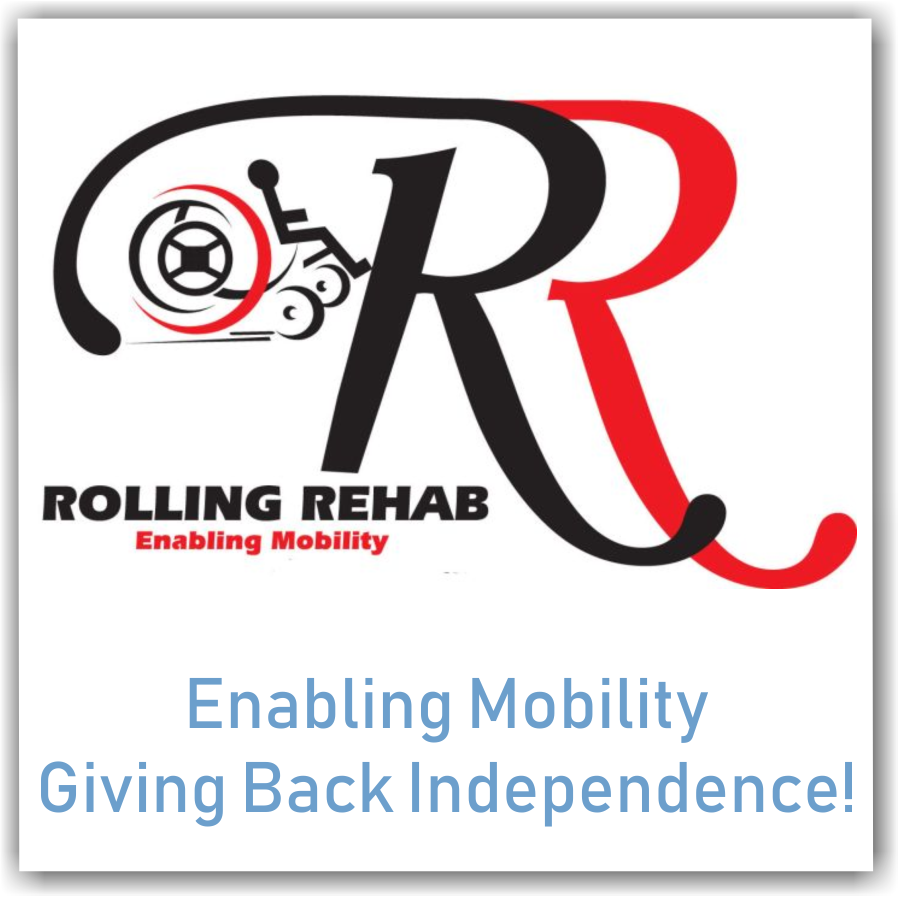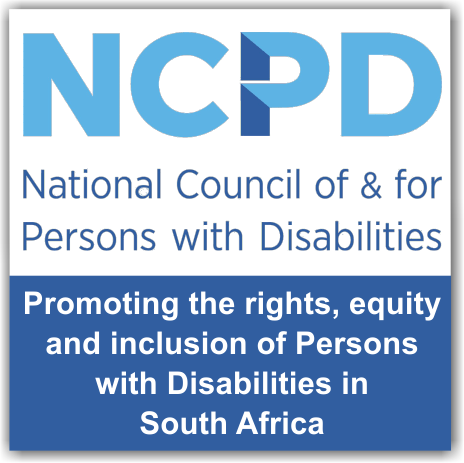Driver Training & Set-Up
Contents: To jump to the topic you would like, click on the links below
Introduction
One of the biggest obstacles that many Persons With Mobility Impairments often encounter, is transport and being able to drive a vehicle. Owning your own vehicle offers many benefits for Persons With Mobility Impairments. Organizations such as the QuadPara Association of South Africa (QASA), Rolling Rehab and the National Council of and for Persons with Disabilities (NCPD) can assist Persons With Disabilities to be able get back on the road safely, thus giving their independence back.
With the assistance of the links to web-sites such as Auto-Mobility and Rolling Rehab (see the links on the left of page & below), the page below, we will assist you to choose an appropriate Driving School & put you in contact with the right people who can assist you. This article also includes information about:
- Learning to Drive
- Obtaining Wheelchair Parking Permits
- Positioning & Set-Up
"Auto-Mobility is a comprehensive hub to driving for people with physical disabilities. Auto-Mobility addresses vital information to potential drivers with disabilities and also offers information on a range of vehicle adaptations, giving solutions and opportunities to become mobile and independent. Auto-mobility covers specific dimensions, features and benefits of selected vehicles." Visit: www.auto-mobility.co.za to find out more.
"Rolling Rehab is an organization that is passionate about assisting people who have a disability & want to drive. We understand that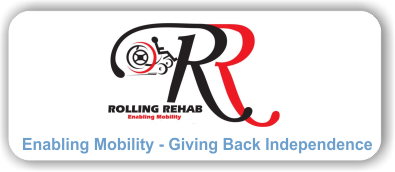 being unable to drive in South Africa is like having a prison sentence, so our aim is to assist people to get back their independence through safe driving. We offer an independent consultancy service, where we do a holistic assessment of the individual’s needs and abilities, and advise whether they are safe to start driving or to continue driving after an accident or illness. We believe that defensive driving is an essential skill for any driver who has reduced physical abilities and therefore we organize a number of defensive driving days throughout the year in partnership with an advanced driving academy." Visit: www.rollingrehab.co.za to find out more.
being unable to drive in South Africa is like having a prison sentence, so our aim is to assist people to get back their independence through safe driving. We offer an independent consultancy service, where we do a holistic assessment of the individual’s needs and abilities, and advise whether they are safe to start driving or to continue driving after an accident or illness. We believe that defensive driving is an essential skill for any driver who has reduced physical abilities and therefore we organize a number of defensive driving days throughout the year in partnership with an advanced driving academy." Visit: www.rollingrehab.co.za to find out more.
Steps To Getting On The Road
Persons With Disabilities who want to be able to drive a vehicle or be able to be transported in their own vehicle, will need to overcome a few obstacles and make a few decisions, before they are able to purchase the correct vehicle and vehicle aids to suit their needs. They should also go for an assessment to make sure that it is safe for them to be driving a vehicle. These assessments can also assist you if you are a passenger in the vehicle. According to the Road Traffic Act there are some restrictions that prevent some people from qualifying to drive due to medical conditions. Chapter 4 of the Road traffic Act states that a person does not qualify to hold a drivers licence if they are affected by one of the following diseases or disabilities:
Read More: Auto-Mobility - Do I Qualify?
There is legislation's and Road Traffic Act’s in place, that you should take note of. To find out more about these, visit:
Auto-Mobility - Legislation
Auto-Mobility - Road Traffic Acts
Should you qualify according to the above legislation's and Road Traffic Act’s, you will be required to go for an assessment to see if it is safe for you to be driving a vehicle. These assessments can also assist you if you are a passenger in the vehicle.
Assessment On Ability To Drive
An assessment is required, if your disability arises as a result of a neurological condition (e.g. Stroke or Traumatic Brain Injury (TBI)), or degenerative disease (e.g. Multiple Sclerosis or Muscular Dystrophy). Assessments are also a suitable safety check for responsible older drivers. Assessments are customized according to the client’s needs & cover all aspects of driving including: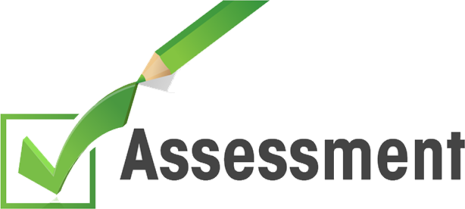
- Assessment of physical ability to operate vehicle controls
- Cognitive Assessment – including perception, decision making, problem solving, and ability to multi-task, understanding and interpretation of the rules of the road.
- Reaction speed test
- Visual screening
- Visual Processing Speeds
- In car assessment
- On- road driving test
One Organization who offer these types of assessments for Persons With Disabilities, is Rolling Rehab.
Rolling Rehab
Rolling Rehab is an Organization that offers an independent consultancy service where they do a holistic assessment of the individual’s needs and abilities, and advise whether they are safe to start driving or to continue driving after an accident or illness which may have affected their ability to adequately control a vehicle. Each assessment is customized according to the client’s needs. The following types of assessments are offered:
Rolling Rehab makes recommendations on what vehicles and adaptations are best suited to their clients needs, as well as running regularly workshops for therapists and driving instructors who want to improve their knowledge about driving adaptations and the effects of disability on driving ability. To find out more, visit: Rolling Rehab - Workshops
Rolling Rehab also offers Defensive Driver Training, which helps the individual learn to adapt their driving style in order to compensate for their disability.“We believe that defensive driving is an essential skill for any driver who has reduced physical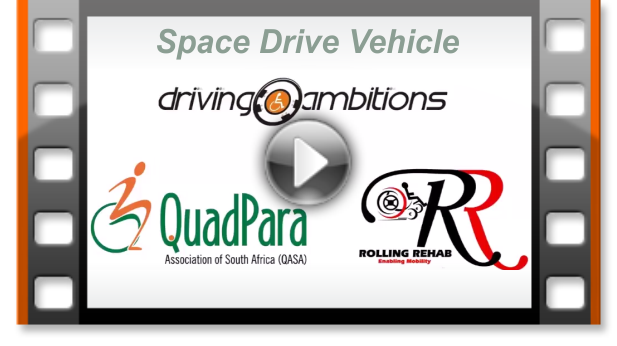 abilities and therefore we organize a number of defensive driving days throughout the year in partnership with an advanced driving academy. To find out more, visit: Rolling Rehab - Defensive Driver Training
abilities and therefore we organize a number of defensive driving days throughout the year in partnership with an advanced driving academy. To find out more, visit: Rolling Rehab - Defensive Driver Training
Once the client’s needs and abilities have been established, Rolling Rehab refers them to a suitable driving school that will prepare them for the K53 test. Rolling Rehab also assists with managing the Driving Ambitions Driving School, under contract to QASA. Visit the YouTube video clip on the right to see driving instructor Caroline Rule in one of the vehicles which is sometimes used and is appropriate for persons who would like to learn to drive from their wheelchair.
If you would like to find out more, you can visit: www.rollingrehab.co.za, or you can contact Rolling Rehab on: rule@global.co.za or phone Caroline Rule on: Cell: 083 560 6886. You can also visit their premises Inside Shoprider Premises: Unit 13 Diamond Park, 92 Jacaranda Street, Hennopspark, 0046.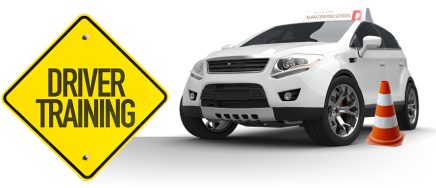
Driver Training
Once you have been assessed & passed to be able to learn to drive, you will be required to get your learners licence and to learn how to drive & pass your license. First time licensing procedures for Persons With Disabilities are exactly the same as for any other person applying for a licence. If a person had a normal licence and then developed a disability, which resulted in them requiring adaptations, or an automatic vehicle to enable them to drive, they are legally required to inform the licensing department and be re-tested. To find out more about "Licensing Procedures", visit: Auto-Mobility - Licensing Procedures
Persons With Disabilities who wish to learn to drive, will need to find a Driving School that can accommodate them. The Driving School would need to have an adapted vehicle to suit them, and they should specialize in teaching Persons With Disabilities to learn to drive.
Driving Schools
There are currently only a few Driving Schools across the country that can accommodate Drivers With Disabilities, however most of these can only accommodate persons who have arm function and no leg function. There are also various Organizations such as the QuadPara Association of South Africa (QASA), Rolling Rehab and the National Council of and for Persons with Disabilities (NCPD) which can assist Persons With Disabilities to be able get back on the road safely, thus giving their independence back. When you are choosing a Driving School, your choice should be based on how the vehicle has been adapted and whether it is suited to your disability. Unfortunately due to the different needs of each individual, Persons With Disabilities are often forced to learn to drive in a vehicle that is not correctly adapted for them, as it is not possible to accommodate all the different types of disabilities. To find out more about "Driving Schools", visit: Auto-Mobility - Driving Schools.
Where no Driving School is available that can accommodate a persons needs, they should first purchase a vehicle and get it adapted accordingly, only then can they learn to drive. To do this, a special motivation is needed for the banks to enable them to get vehicle finance with only a learner’s licence. They will also need to get their insurance pre-approved before the bank will agree to finance them.
To find lists of "Driving Schools" in your area, visit:
- Auto-Mobility - Driving Schools
- Rolling Rehab - Driving Schools
- Disability Info South Africa - Driving Schools
One Driving School that does accommodate many different types of Mobility Impairments, is Driving Ambitions Driving School. Rolling Rehab assists to manage the Driving Ambitions Driving School, under contract to the QuadPara Association of South Africa (QASA).
Driving Ambitions
Driving Ambitions has 4 adapted automatic vehicles that can accommodate many different types of disabilities, including 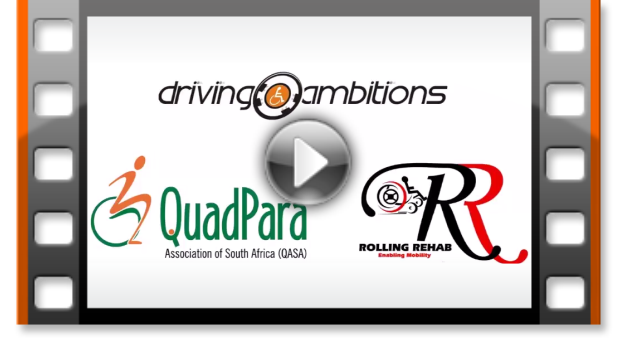 Quadriplegics, Paraplegics, Strokes, Amputees and Cerebral Palsy. One of these vehicles that is used is a Renault Kango, "Drive From Wheelchair Vehicle", which QASA has deployed in the Johannesburg and Pretoria area. This vehicle has been donated to them and Driving Ambitions by Geoff Dear of Cape Mobility. The vehicle is appropriate for persons who would like to learn to drive from their wheelchair. To view more information about this vehicle and how it works visit the YouTube video clip on the right.
Quadriplegics, Paraplegics, Strokes, Amputees and Cerebral Palsy. One of these vehicles that is used is a Renault Kango, "Drive From Wheelchair Vehicle", which QASA has deployed in the Johannesburg and Pretoria area. This vehicle has been donated to them and Driving Ambitions by Geoff Dear of Cape Mobility. The vehicle is appropriate for persons who would like to learn to drive from their wheelchair. To view more information about this vehicle and how it works visit the YouTube video clip on the right.
A Rolling Rehab representative assesses each client in order to establish which controls are best suited to their abilities, and how they are best positioned in the vehicle to enhance their driving ability. QASA’s aims is to assist Persons With Disabilities to become more employable by helping them to get a driver’s license. Sponsorship is available through QASA for Persons With Spinal Cord Injuries who are unemployed or who earn a low salary. For more information and the application forms, go to www.drivingambitions.co.za or contact QASA on 031 767 0348/52.
The QuadPara Association of South Africa (QASA): (QASA) is a non-profit organisation (NPO 000-881) of Quadriplegics and Paraplegics in South Africa. QASA’s mission is “to improve lives by securing resources to advocate, educate, capacitate, support and mobilize”. QASA’s vision is that “all quadriplegics and paraplegics will live their lives to their full potential”. QASA develops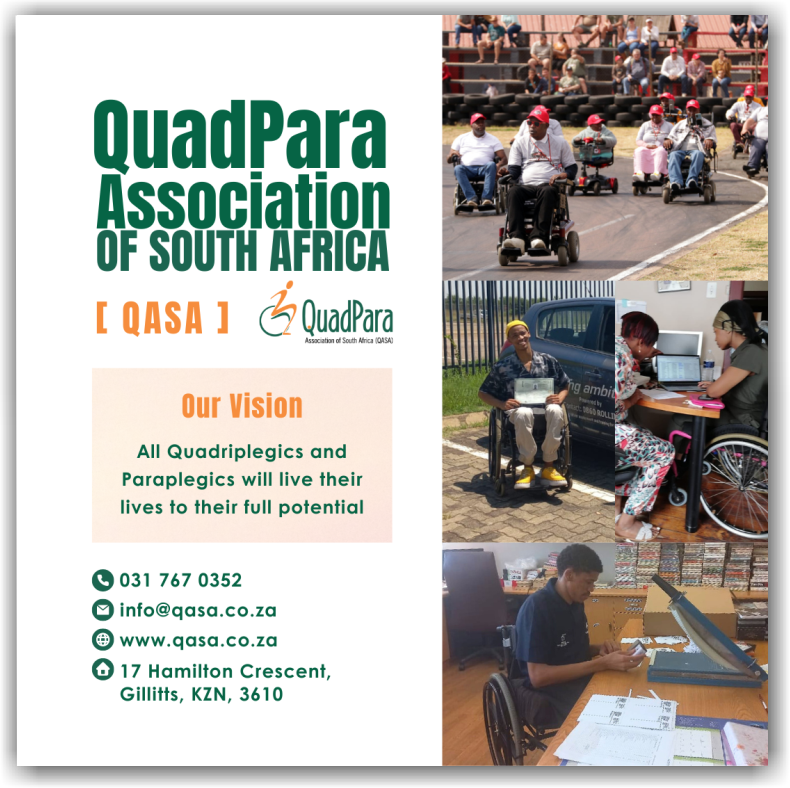 products, programmes and services for quadriplegic and paraplegic members to build their capacity and ensure opportunities for societal integration and empowerment. These projects include but are not limited to the QASA - Driving Ambitions:
products, programmes and services for quadriplegic and paraplegic members to build their capacity and ensure opportunities for societal integration and empowerment. These projects include but are not limited to the QASA - Driving Ambitions:
QASA - Driving Ambitions: A major barrier facing persons with disabilities is a lack of accessible public transport, which is a huge obstacle for wheelchair users trying to lead an independent life. Recognising this, QASA rolled out a driver training project in KwaZulu-Natal, Gauteng and the Western Cape to teach persons with mobility impairments to drive a vehicle fitted with hand controls.
Should you be interested in joining this programme you will have to meet the following requirements:
- Be a QASA member - if not fill in a membership application form.
- Have a physical disability.
- Possess a valid learner’s license.
- A South African ID document.
- The candidate must be focused and committed to attending classes every day with the ambition of wanting full time employment at the end of the programme.
Click on the link above to find out more about Driving Ambitions, or visit our Organizations - QASA Page to find out more about QASA and the other Projects and Services that they provide, or their website at www.qasa.co.za.
National Council of and for Persons with Disabilities (NCPD)
The NCPD is a NGO with a footprint throughout South Africa that plays a lobbying & advocacy role when it comes to the rights of persons with disabilities. "We're an umbrella body coordinating the advancement of the rights of persons with physical disabilities in accordance with the White Paper on the Rights of Persons with Disabilities, the UN Convention on the Rights of Persons with Disabilities and more. We have nine provincial Associations for Persons with Disabilities with numerous projects and branches that focus on rural development as well as social."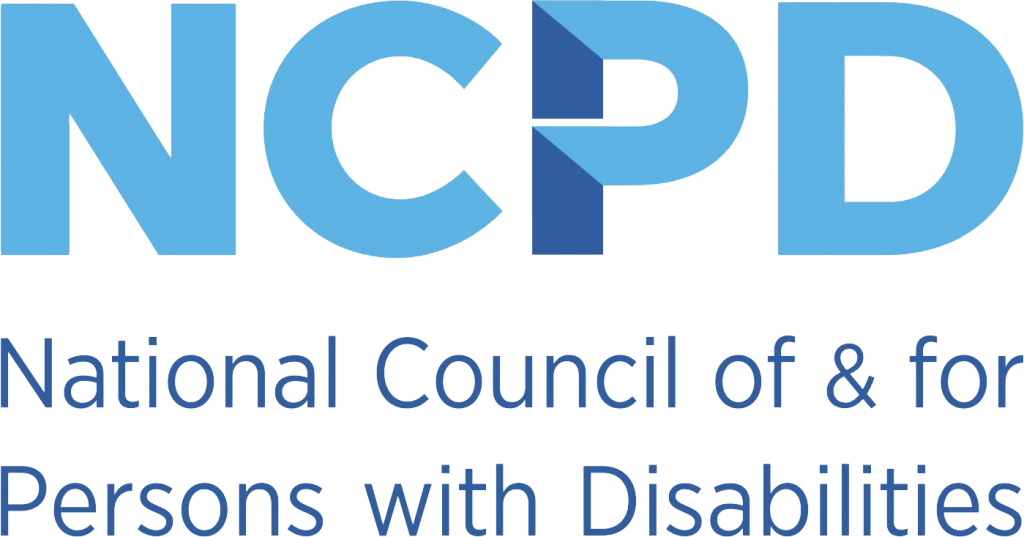
The National Council of and for Persons with Disabilities does advocacy work and services leading to an equitable and inclusive society. "We are affiliated to the South African Disability Alliance, as well as Rehabilitation International. Our programmes cover the whole of South Africa."
The National Council of and for Persons with Disabilities offer a wide variety of different types of Services, including short training of Professionals in the Services and Health profession, for which these professionals get CPD points. This training includes Transport and driving training. The majority of training sessions can be tailor-made to suit your needs.
Positioning & Set-Up
Any person with limited body function as a result of a disability, requires correct positioning and set-up. Correct positioning in the vehicle can help to optimize the physical function of drivers in order to optimize their driving performance & therefore keep them safe on the roads. Each individual should be correctly positioned in the car according to their body height, proportions and strength. This can make the difference between having the physical ability to avoid an emergency situation, compared with finding that they are trapped and unable to escape as a result of not having the agility to manoeuvre their vehicle out of harm’s way.
To find out more about "Positioning & Set-up", visit: Auto-Mobility - Positioning & Set-Up.
Due to the wide variety of different types of disabilities, each person is different. There are therefore various solutions to each persons type of disability or Mobility Impairment. These solutions can be a combination of the correct positioning and set-up & the right type of Vehicle Aids & Hand Controls. To find out solutions for these, visit the appropriate section below:
Spinal Cord Injury
Correct positioning in the vehicle can help to optimize the physical function of drivers who have limited body function as a result of a spinal cord injury. Paralyzed trunk muscles result in poor balance in the vehicle, the severity of balance loss depends on the level of injury. Visit the links below to find out more:
Rolling Rehab - Driving After Spinal Cord Injury
Auto-Mobility - Driving After Spinal Cord Injury
Amputation
The use of prosthesis on primary controls for driving is questionable, and is usually dependent on the length of the residual limb as well as how well the individual has developed a sense of where the end of the prosthesis is. Generally speaking a well rehabilitated person with a below knee amputation can learn to drive with their prosthesis, however with an above knee amputation, they should preferably drive with adaptations. Visit the link below to find out more:
Auto Mobility - Driving After Amputation
Stroke or Head Injury
Strokes and head injuries result in very similar clinical features, depending on the density of the damage, which areas of the brain were damaged and how large the area of damage was. These include partial or complete paralysis down one side of the body, sometimes with sensory loss resulting in a difficulty knowing where the limb is, or difficulty coordinating movements on that side of the body. Damage to the visual cortex may result in a loss of visual fields. Visit the link below to find out more:
Auto Mobility - Driving After Stroke Or Head Injury
Cerebral Palsy
There are a number of different types of cerebral palsy and the potential to learn to drive varies depending on the severity and what features are present. Automatic exclusions for driving which are common amongst people with cerebral palsy include: uncontrolled epilepsy; severe movement disorders such as athetosis and ataxia; inadequate vision and severe learning problems. Visit the link below to find out more:
Auto Mobility - Driving With Cerebral Palsy
Short Stature
Persons of short stature have two challenges, which include: seeing over the steering wheel and reaching the pedals. Short stature is often frequently combined with a lack of function in the limbs, particularly the lower limbs in which case the individual will need to use hand controls. The body parts are often not in proportion to the rest of their body, resulting in some people having normal length arms while others have long arms in relation to their body. Visit the link below to find out more:
Auto Mobility - Driving - Short Stature
Wheelchair Parking Bays & Disks 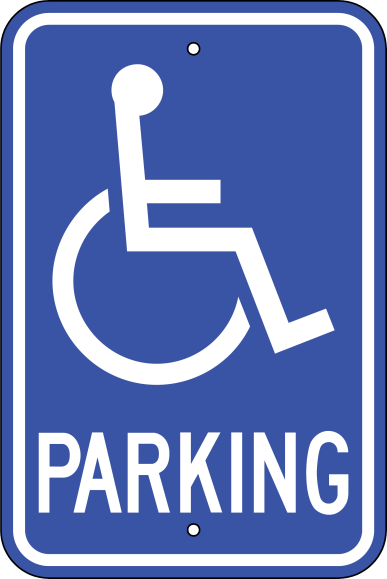
Wheelchair Parking Bays & Disks are for persons who use wheelchairs and drive themselves or who are transported in a vehicle. These Wheelchair Parking Bays are set aside for wheelchair users & Persons With Disabilities. They are not only close to the entrance, but are also wider than the average parking bay. Wheelchair Parking Bays are traditionally 3500mm wide to cater for a wheelchair user who needs the extra space to enter or exit the vehicle. This extra space helps these transfers to be done safely for the wheelchair user & helps prevent the vehicle in the parking space near by from getting damaged. Persons who use these parking bays need to apply for a Wheelchair Parking Permit, also known as a"Disabled Parking Permit", "Handicapped Permit", "Disabled Placard" or "Disabled Badge", which is displayed on the vehicle upon parking it in one one of these bays. These Parking Permits can be registered & obtained from various Organizations such as the National Council of and for Persons with Disabilities (NCPD) & QASA.
PrDP Licence
Persons who are going to drive a vehicle & transport Persons with Disabilities, should apply for a PrDP Licence. A Professional Driving Permit (PrDP) is required to drive public transport and heavy duty vehicles, such as taxis, buses and breakdown vehicles. To transport passengers for an income you must have a Professional Driving Permit (PrDP). Before it was called a PrDP, a Professional Driving Permit was originally called a Public Drivers Permit (PDP) which was issued to drivers before 1998.
There is currently no law stating that a Person with a Physical Disability is not allowed to have a PrDP Licence, as long as that person is able to demonstrate to an examiner that they have adequate control of the vehicle at all times. The medical criteria for a PrDP are however significantly stricter than a normal Drivers Licence. The PrDP Permit is issued in addition to an ordinary drivers licence & applies to the following motor vehicle categories: Auto-Mobility - Professional Driving Permits
To find out more about, Professional Driving Permits (PrDP), visit: Western Cape Government - Professional Driving Permit (PrDP).
